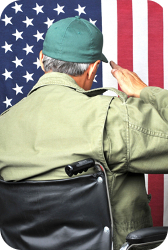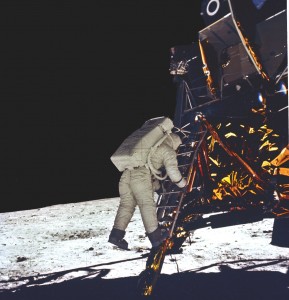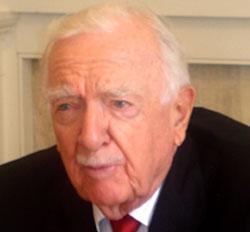
Congress — on occasion — passes laws that have some good or at least a good intention.
One would hope, at least, some good intentions spurred lawmakers to add riders to the Defense Authorization bills in 2008 and 2009 which expanded the ability for veterans who are not in uniform to render a hand salute.
In the past, only members of veterans service organizations who wore their organization’s official headgear were traditionally allowed to hand salute during the National Anthem, according to an article on Military.com. Veterans and other civilians not in uniform — likewise a tradition — normally place their right hands over their “hearts” in lieu of a military-style hand salute for the playing of the anthem and other flag-related activities.
Thanks to an amendment in the 2008 Defense Authorization Act retired military members and veterans can now give a hand salute whenever the U.S. flag is raised, lowered or passes.
A 2009 amendment to that fiscal year’s defense bill allows out-of-uniform military personnel and veterans to render a hand salute during the National Anthem.
Now the growing number of people in the U.S. who have no connection whatsoever with the military and even some veterans themselves might wonder why would such a law be passed?
The answer is that there was obviously some sentiment among veterans and military retirees, not to mention some of the powerful veterans organizations, for codifying such a practice. Why? I don’t know. It seems as if the law lacks some practicality insofar as enforcement is concerned.
Let’s say you are at a high school football game. The National Anthem is played and the colors are presented on the field by the local Junior ROTC drill team. You, the veteran, are wearing a big pair of horns on your head because your team is the Longhorns. Now do you do the hand over your chest or give the military hand salute?
Okay, say you give the hand salute. A local cop sees you comes over and starts grilling you about being in civvies and giving a military-style salute. You say it’s legal now. The cop said he never heard anything about it. You say: “Trust me.” The cop says: “Okay. I’ll trust you if you can show me some ID proving you are a veteran.”
Now one might think such a request would be easy. But it isn’t necessarily all that simple.
You, the veteran with the longhorn hat, spent your four years and got out of the service. You have your DD-214 form which proves your service — somewhere — although it is not on your “person,” as the cop who questioned you might say. You didn’t retire from the service so you don’t have a military retiree ID card. You don’t go to the VA for health care so you don’t have a VA identification card. You don’t belong to the VFW, American Legion, DAV or any other veterans organization. Basically, you are SOL to use a good old military acronym until you call up the county clerk in the next state where you filed your DD-214 after getting out of the service and ask her to send a copy to the local authorities.
Now that scenario about the ball game and the hassle by the cops and all the trouble is a lot of hyperbole. Heck, I have no idea as to whether there even is any enforcement mechanism in laws which let you honor the flag with that sharp, five fingers (if you got ’em) salute with the tip of your index finger next to the right eyebrow.
If I ever gave a military salute, it would probably be in a situation in which other veterans might do the same thing, say at some kind of veterans program or maybe a funeral with military honors.
Personally, I have always thought the hand salute is pretty cool. It is a sign of respect unlike so many others, which carries with it non-verbal cues aimed toward the object or individual one is saluting.
For instance: You salute an officer you don’t know. You are saluting his position and authority. You salute an officer you do know and like. You are saying: “Hey, what’s happening bud?” without being insubordinate. You salute an officer you know and don’t like. You are saying: “I respect your rank. Now chuck you farley.”
So just remember when you see a civilian saluting the flag or during the National Anthem that Congress gave this man or woman the right to wear their civilian clothes and give a good old military-type hand salute, one each, because of the sacrifice these folks made for their country. As to whether they are really veterans, I guess you’ll just have to take it on faith. Or ask to see some ID, at your own risk. You certainly wouldn’t want to get gored by those horns.



